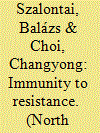| Srl | Item |
| 1 |
ID:
174442


|
|
|
| 2 |
ID:
130550


|
|
|
|
|
| Publication |
2014.
|
| Summary/Abstract |
Purpose-This article investigates whether certain social and subnational groups that have shown resistance against other one-party states might play a similar role in North Korea.
Design/methodology/approach-Comparing the DPRK with various Communist regimes and Baathist party-states in Syria and Iraq, this article examines the following social groups as potential factors of resistance: industrial workers, private entrepreneurs, and religious, ethnic and regional identities.
Findings-Resistance has not been wholly absent in North Korean, but the disaffected social groups have lacked sufficient bargaining power, while the state has occasionally refrained from steps that triggered protests in other countries.
Practical implications-By comparing the DPRK with various types of regimes (pre-reform Communist systems, partially market-oriented Communist systems, and Baathist party-states), the article also seeks to investigate whether the dynamics of North Korean society is largely unique, or if it can be at least partially explained by means of analogy.
|
|
|
|
|
|
|
|
|
|
|
|
|
|
|
|
| 3 |
ID:
101737


|
|
|
|
|
| Publication |
2011.
|
| Summary/Abstract |
What can models of interest group behaviour from American politics tell us about the existence, activities, and influence of international non-governmental advocacy organisations (advocacy INGOs) in International Relations? In this article I detail an analogy between traditional American interest groups and advocacy INGOs in order to suggest a new approach to theorising INGOs. American politics theories of interest groups provide insights to questions which International Relations has been unable to answer satisfactorily, including where INGOs are likely to be found; how INGOs will grow in the future; the organisational structure of INGOs; the impact of competing groups on the quality and content of foreign policy and international agreements; and the roles of INGOs in different stages of the policy process. Viewing INGOs as interest groups provides a curative to the tendency to view them as self-sacrificing knights in shining armour. Competing INGOs representing narrow interests can nevertheless contribute to the common good in the form of effective, efficient policy.
|
|
|
|
|
|
|
|
|
|
|
|
|
|
|
|